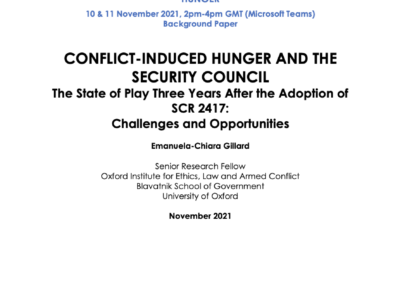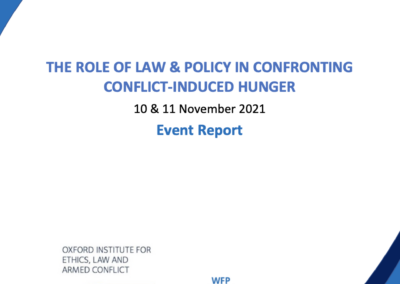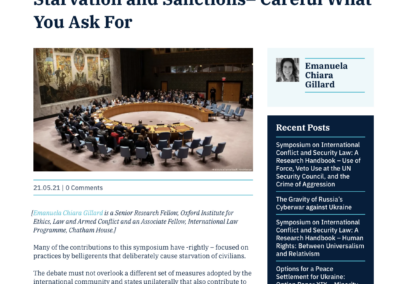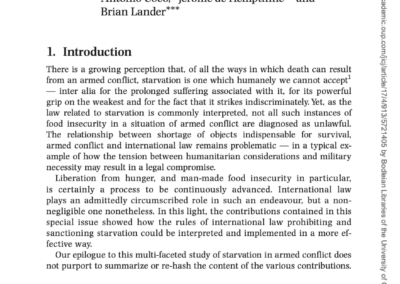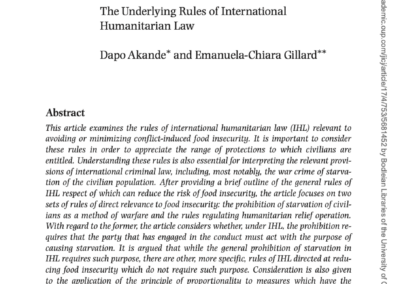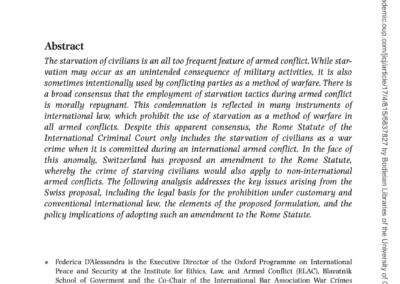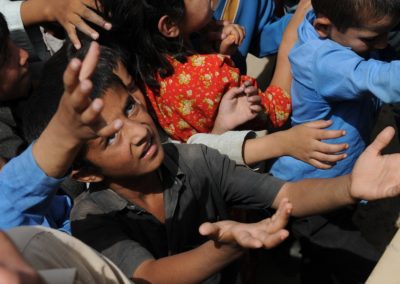In 2020, it was estimated that out of 155 million people experiencing acute hunger, 99 million did so because of conflict and insecurity. The Oxford Institute for Ethics, Law and Armed Conflict (ELAC) has partnered with the World Food Programme (WFP) to explore how international law might address the nexus between conflict and hunger. ELAC’s work in this area builds on earlier academic and policy work on the law relating to humanitarian relief operations in situations of armed conflict.
Arising out of this partnership, ELAC convened a workshop in 2019 on the topic of conflict-induced food insecurity. This led to a series of papers on Starvation in International Law, published in a special issue of the Journal of International Criminal Justice.
In November 2021, ELAC and the WFP reconvened the legal experts that contributed to the Journal’s special issue, in addition to a wider group of practitioners and policy experts, to examine the role that international law and policy should play in confronting conflict-induced hunger. The aim of the virtual workshop, which was held with the active participation of representatives from governments, international organizations, civil society, and academia, was to elucidate concrete opportunities for multilateral action. In particular, the participants sought to identify ways to build upon the foundations of the conflict-induced hunger agenda laid by Security Council Resolution 2417 in 2018.
The workshop aimed, first, to clarify the international legal framework around hunger. The participants considered how the relevant rules of international law could be interpreted and implemented, more effectively, to ensure accountability for states and individuals and contribute to the prevention of famine. The workshop also sought to ground the discussion in the challenges, realities, and opportunities facing efforts to implement Resolution 2417. Building on studies authored by ELAC Senior Research Fellow Emanuela-Chiara Gillard and by researchers at Fordham University, the workshop dealt with the dynamics inside the Security Council and explored how collective efforts could be broadened within or across regional organizations. With the help of a presentation by ELAC Senior Research Fellow Hugo Slim, the workshop also examined the initiatives which could be undertaken by humanitarian actors, including the WFP, to prevent famine and to best tackle the challenges and opportunities involved in the reinvigoration of the conflict and hunger agenda.
The full event report is available here.
You can read the papers authored by ELAC’s Director and Fellows here:
-
- Emanuela-Chiara Gillard, Conflict-Induced Hunger and the Security Council — The State of Play Three Years After the Adoption of SCR 2417: Challenges and Opportunities, November 2021
- Hugo Slim, WFP Policy Engagement to Prevent Famine and Foster Peace, November 2021
- Dapo Akande, Emanuela-Chiara Gillard, Conflict-induced Food Insecurity and the War Crime of Starvation of Civilians as a Method of Warfare: The Underlying Rules of International Humanitarian Law, Journal of International Criminal Justice, Volume 17, Issue 4, September 2019, Pages 753–779
- Antonio Coco, Jérôme de Hemptinne, Brian Lander, International Law Against Starvation in Armed Conflict: Epilogue to a Multi-faceted Study, Journal of International Criminal Justice, Volume 17, Issue 4, September 2019, Pages 913–923
- Federica D’Alessandra & Matthew Gillett, The War Crime of Starvation in Non-International Armed Conflict, Journal of International Criminal Justice, Volume 17, Issue 4, September 2019, Pages 815–847
- Emanuela-Chiara Gillard, Starvation and Sanctions – Careful What You Ask For, Opinio Juris Pandemic of Hunger Symposium, May 2021
